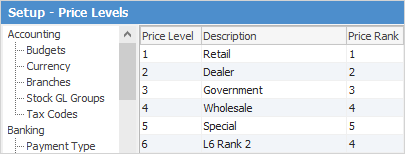
Price ranking is a secondary setting on price level setup that enables automatic stepping to a higher price when a product does not have a price level to match that of the card code.
•In its simplest form, you would set the price rank to match the price level in descending order. The result is: if stock does not have a price level to match the price level of the card code selected on the job, Jim2 will select the next highest price level in line, eg. card code on job is price level 5, but the stock only has price levels 1 to 4, so the stock would appear on the job at price level 4, as that is the next rank; or
•Set Price Level 1 to Price Rank 1 and all other price levels to Price Rank 2.
The result is: if the stock price level does not match that of the card code, it will revert to price level 1, eg. the card code on job is price level 5, but the stock only has price levels 1 to 4, so the stock would appear on the job at price level 1, as that is the next rank.
In a more complex pricing situation, price ranking can be used to build multiple pricing alternatives.

Using the price level setup example above, Price Levels 2-5 each drop down one level, but Price Level 6 drops straight to Price Level 3 because Price Level 6 is at Price Rank 4. If the card code price level is 5 but the stock code price level only goes to 4, the stock will be charged at Price Level 4.

INK.BR.LC47C

INK.BR.LC47M
Assuming a job for a card code at Price Level 6:
▪INK.BR.LC47C would be charged at $16.05 (Price Level 6) while
▪INK.BR.LC47M would be charged at $16.10 (Price Level 3 – the first available after Price Rank 4)
How Would You Use This?
To provide a range of deals on a select group of products for a select group of customers. For example, a sub-set of dealers (Price Level 2) have been moved to Price Level 6. Now they get the special price for those products in Price Level 6, but the normal Price Level 2 for everything else.
This method provides an alternative to customer special pricing in that it is effectively customer group special pricing.
Further information: